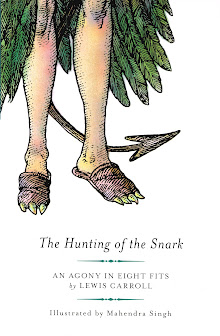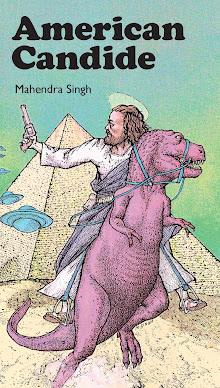 The indictment had never been clearly expressed,And it seemed that the Snark had begun,And had spoken three hours, before any one guessedWhat the pig was supposed to have done.The Jury had each formed a different view(Long before the indictment was read),And they all spoke at once, so that none of them knewOne word that the others had said.
The indictment had never been clearly expressed,And it seemed that the Snark had begun,And had spoken three hours, before any one guessedWhat the pig was supposed to have done.The Jury had each formed a different view(Long before the indictment was read),And they all spoke at once, so that none of them knewOne word that the others had said.Page 42 of any work of literature will always be redolent of the highest Carrollian vibes imaginable; to wit, the well-known mojo of the Puissant Number 42 is at this very moment shedding its potent tantric vibe over the above drawing, a drawing dedicated to the ubiquitious situation of everybody speaking at once so that nobody knows what’s being said.
The late, great Strother Martin (probably one of the Heiddeger Martins from Heidelberg, back in the old country) once noted, in a similar situation involving some other dunderheads messing about with the law, phenomenology and life’s problems in general, that what we have here is a failure to communicate. But how to illustrate such a situation without in turn failing to communicate one’s own self? How can we avoid the relentless, downward spiral of miscommunication, and distrust which so plagues modern youth?
Such logical intricacies were a sort of busman’s holiday for a certain class of Hindu (and Buddhist) philosophers and sages of yore whose otherwise innocuous turbans concealed brains possessed with a fiendish capacity for splitting hairs. The very antithesis of the plain-talking Strother Martin, these learned gentlemen delighted in concocting the metaphysical equivalent of the blazing hot curries on which they subsisted; arguments possessed of such piquancy that they were often disguised as bland, easy-to-swallow parables lest they frighten the kiddies or scare the livestock, so to speak.
The most famous of such parables describes the misguided attempt by a group of blind brahmins to describe what an elephant is like through touch alone. One brahmin, grasping the trunk, thinks the elephant is rope-like, the other hugs a leg and finds the elephant to be tree-like, and so on until you, the befuddled reader trapped in your occidental web of illusion, get the point and purchase another round of curry for the house.
Needless to say, this illusion business (better known as
maya in the finer sort of new — and old — deli) is further compounded by this artist with the addition of a really top-knotch epistomelogical corker: the multivalent confusion generated by having everyone concerned being the same person.
In such a case, when observer and observed are one and the same, one can truly say that anything anyone might have to say about anything will be best classified as everyone speaking at once and hence no one knowing what is said
(pauses to wipe forehead with a dampened dosa). Or as a certain neologizing German thinkwallah might have put it, what we have here is a failure to
überselbstzeichnungangstgemachen.
Stay tuned, tolerant reader, for next week’s exciting, hijacked episode of Lewis Carroll’s
Hunting of the Snark … or something like that …
___________
Late-Breaking Snark News … NYC Snarkistas Take Notice!Peter Pavlakis' film version of the
Snark will be premiered at the Queens International Film Festival, Saturday, November 14th.
Further information can be found here, plus a neat trailer. It looks quite interesting, a live action version to boot! Best of luck to Peter and if any readers see it, I would love to read your comments & critiques. To the best of my knowledge, this is the 2nd live-action film version currently in production or being shown in North America right now, the other being
Michael McNeff's … could this be the long-awaited Snarkian Renaissance which sweeps Hollywood into a craze for All-Things-Nonsense?










